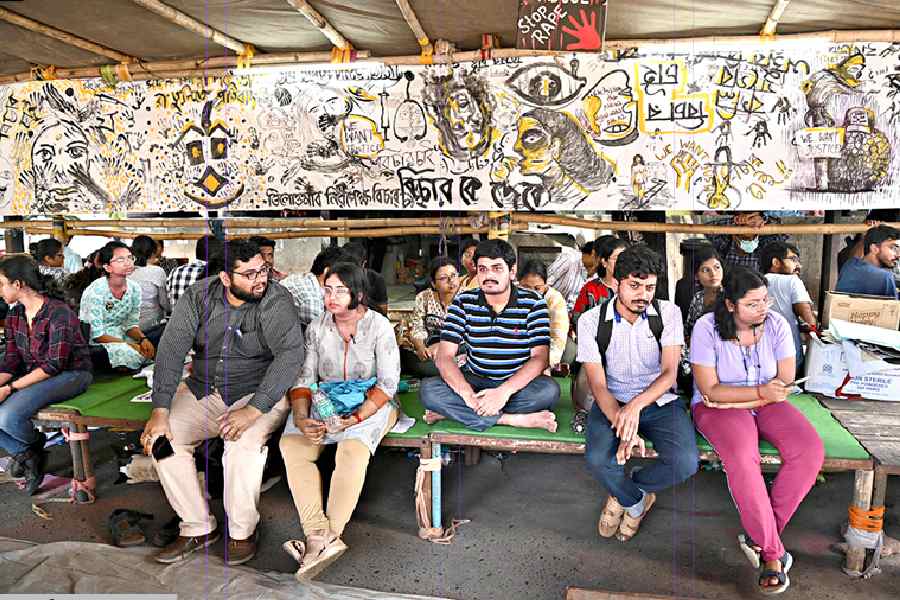Doctors must continue to demand justice for the 31-year-old postgraduate trainee who was raped and murdered at RG Kar Medical College and Hospital but the cease-work by junior doctors that is now 22 days old is “against the ethos of the medical profession” because patients are being denied treatment, said two senior government doctors.
Both said they supported the cease-work in its initial days but now think it is “stretching too long”.
This newspaper wrote on Friday that nearly seven lakh patients across 26 government medical college hospitals have been denied treatment in OPDs since August 9, when the strike began. There are tens of thousands of others who were denied admission or laboratory tests and procedures.
The two doctors, who requested anonymity, spoke about what they felt.
SSKM faculty
The rape and murder of the woman is the most shocking incident I have come across in a hospital in my long career as a doctor and teacher at a medical college hospital in Calcutta. I was in support of the protest by junior doctors and I also want proper investigation into the heinous crime and want the real culprits to be punished.
But we have to understand that the investigation and justice will take time. Not to see patients till justice is delivered is the wrong approach.
More than three weeks have passed since the ceasework started and this is a very long time. The protesting doctors are saying they are fighting for a social cause. But through this long cease-work they are actually punishing the society. The society has a big contribution to making a doctor and we should not forget that.
This denial of treatment to tens of thousands of patients is not only giving Bengal a bad name in the country but also globally. This is against the ethos of the medical profession.
The huge dip in the number of patients coming to government medical colleges does not mean a lower number of cases. Rather, it shows that common patients who come from far away districts to Calcutta in the hope of good treatment are losing their faith in us.
Now, a large number of patients are staying away from government medical college hospitals because they know it is uncertain whether treatment would be available.
Another important fact is that many of the senior doctors, my colleagues, who are working overtime, are senior citizens. Most of them have to be at the OPD from morning to afternoon and then visit the wards and do procedures. We have taken it in our spirits to treat patients but many of us can get fatigued working overtime for long.
The government healthcare system is still active because fewer patients are coming to us. If the number of patients goes back to normal and the workforce is without the junior doctors, the system will collapse. Who will be responsible for that? I am confused now.
Public health expert
A doctor’s primary responsibility is to treat patients and, if we stop doing that, it is unethical.
There are two dimensions to the incident.
The rape and murder of our colleague has exposed the lack of security in the hospitals which, I think, needs to be addressed by the government with utmost seriousness. Until that is done, the situation remains extremely volatile.
On the other hand, the long cease-work is dealing a serious blow to our health system, defeating the purpose of the initial protests.
As doctors, the rape and murder has triggered deep anger, sorrow and helplessness in tens of thousands of other Calcuttans.
As doctors, we have to provide service despite the emotions. Otherwise, we are failing as professionals and the cause for which are staging protests.
I think the cease-work should be withdrawn and doctors can still protest by taking out rallies and wearing black bands.
A strike is an old form of protest by deprived workers against factory owners. In this case, the strike is against the government. But ordinary people are being denied treatment, which the junior doctors have to consider.
The relations between a doctor and a patient should be that of a mother and child. The mother may beat or scold the child but cannot deprive it of the mother’s milk.











